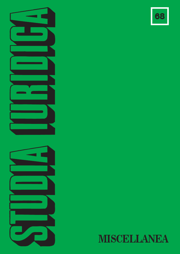The Critique of Copyright in Hans-Hermann Hoppe’s Argumentation Ethics
The Critique of Copyright in Hans-Hermann Hoppe’s Argumentation Ethics
Author(s): Cezary BłaszczykSubject(s): Law, Constitution, Jurisprudence
Published by: Wydawnictwa Uniwersytetu Warszawskiego
Keywords: copyright; argumentation ethics; praxeology; libertarianism
Summary/Abstract: The accurate interpretation of Hans-Hermann Hoppe’s argumentation ethics inevitably leads to the conclusion that appropriation of creative works ought to be rejected since only tangibles can and need to be owned for artistic conceptions are ideal, not-scarce (non-excludable and non-rivalrous) objects. Moreover, their ownership would inevitably lead to a conflict over titles to their exemplars. Incorporeal rights are thus inconsistent with both the praxeological axiom and absoluteness of negative rights. Hence, an attempt to introduce “artificial scarcity” through positive copyright law is unethical. It disregards the fundamental rules of any rational ethics: universality (equality before the law) and operationality (suitability for mankind survival) because it interferes with the propertarian axiom of self-ownership and the principle of non-aggression. Therefore, a property in artistic conceptions is neither rationally feasible nor indispensable and entails self-contradiction of any deontological theory based on rules of praxeology.
Journal: Studia Iuridica
- Issue Year: 2016
- Issue No: 68
- Page Range: 33-54
- Page Count: 22
- Language: English

